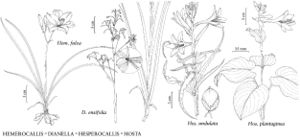Difference between revisions of "Hosta plantaginea"
Bot. Zeitung (Berlin) 21: 53. 1863.
FNA>Volume Importer |
FNA>Volume Importer |
||
| Line 27: | Line 27: | ||
|elevation=0–100 m | |elevation=0–100 m | ||
|distribution=Pa.;expected elsewhere;se China. | |distribution=Pa.;expected elsewhere;se China. | ||
| − | |discussion=<p>Hosta plantaginea is widely cultivated for its fragrant white flowers, which open in late afternoon or evening. This showy species was the first Hosta cultivated in Europe, starting in 1784, and then in the New World. Following its introduction from China, it was planted by the thousands in public gardens and became known as Parisian funkia or hosta.</p> | + | |discussion=<p><i>Hosta plantaginea</i> is widely cultivated for its fragrant white flowers, which open in late afternoon or evening. This showy species was the first <i>Hosta</i> cultivated in Europe, starting in 1784, and then in the New World. Following its introduction from China, it was planted by the thousands in public gardens and became known as Parisian funkia or hosta.</p> |
|tables= | |tables= | ||
|references= | |references= | ||
| Line 52: | Line 52: | ||
|publication year=1863 | |publication year=1863 | ||
|special status= | |special status= | ||
| − | |source xml=https://jpend@bitbucket.org/aafc-mbb/fna-data-curation.git/src/ | + | |source xml=https://jpend@bitbucket.org/aafc-mbb/fna-data-curation.git/src/8f726806613d60c220dc4493de13607dd3150896/coarse_grained_fna_xml/V26/V26_390.xml |
|genus=Hosta | |genus=Hosta | ||
|species=Hosta plantaginea | |species=Hosta plantaginea | ||
Revision as of 17:44, 18 September 2019
Plants forming open clumps 60–90 × 45 cm; rhizomes not stoloniferous. Leaves: petiole erect, spreading, light green, to 25 cm; blade light yellowish green, orbiculate to cordate, 20–28 × 15–24 cm, base decurrent, apex acuminate; veins in 6–9 lateral pairs. Scape 60–80 cm. Inflorescences: racemes bright green, 10–15-flowered, stout, solid, to 25 cm; floral bracts large, greenish white, ovate-lanceolate, navicular; sterile bracts leafy, sparse. Flowers to 13 cm, fragrant; perianth long-tubular; tepals white, lobes sharply recurved; anthers yellow. Capsules large, elongate, apex pointed. 2n = 60.
Phenology: Flowering late summer (August).
Habitat: Disturbed open areas
Elevation: 0–100 m
Distribution
Pa., expected elsewhere, se China.
Discussion
Hosta plantaginea is widely cultivated for its fragrant white flowers, which open in late afternoon or evening. This showy species was the first Hosta cultivated in Europe, starting in 1784, and then in the New World. Following its introduction from China, it was planted by the thousands in public gardens and became known as Parisian funkia or hosta.
Selected References
None.
